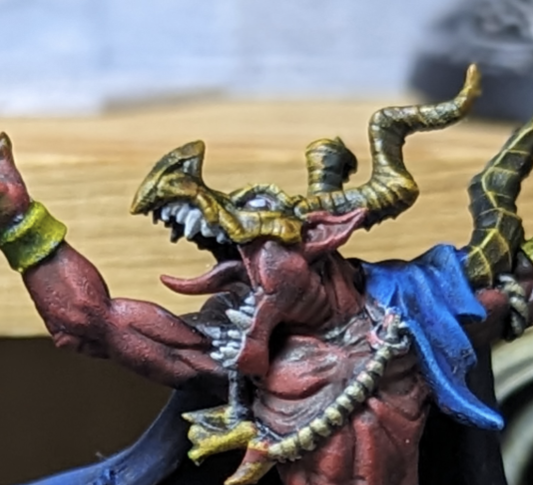- 20 Posts
- 81 Comments

 1·12 days ago
1·12 days agoI’d probably just do thin layers since I’m not great at dry-brushing either. But either could work.

 1·12 days ago
1·12 days agoHow do I decide the color scheme of priming? It’s a hard question to answer because many different approaches can work. I believe the technique is called underpainting, especially in the fine arts world. For example, many clasical painters will paint skin green first as an underpaint before making them more skin tones.
One heuristic you could use would be to think about the light color coming from the sky and reflecting from ground. For example, a warm sunny day over a forest floor would be yellowish from above and green from below.
But I think the two color priming can lead to interesting results regardless of what colors you choose. Though I might try to make the under color darker in value that the over color.
For fire skinned orcs, if you’re going for glowing from within I would base white followed by layers/drybrushing of yellow, orange, red, then brown.
If you want red skin I think your idea could be super interesting. Just make sure you mix some of those colors into your reds as you layer up, as well as letting some of those colors show through in the deepest shadows.
Keep on practicing and exploring. You’re asking great questions!
Thanks! I’m happy with how it turned out.
I haven’t seen state of play, but mixing colors/color theory can be quite fun!
Inks can be fiddly, but they can produce great results. They’re more prone to tearing or reactivating and wearing away than normal acrylics so you have to be gentle with them after applying.
Also, you can glaze with most any acrylic paints in addition to inks. Some colors have more transparent pigments in them and will work better than others but the technique can still be used.
Inks tend to be quite strong so I usually dillute them heavily with water before applying thin glazes. They do work with mediums, but I don’t tend to use them.
The slime is made from modge podge dimensional magic with some inks over the top.
Thanks, it was really fun moving from red to green on these dirty fellas.

 2·21 days ago
2·21 days agoSounds great! I love painting skin because it can be so varied in hue. Even human skin has greens and blues in it even though it’s usually looks more brown, red or yellow.

 2·21 days ago
2·21 days agoWhat a fun project. I like the greens mixed into the blue skin.

 1·21 days ago
1·21 days agoI’m certainly not painting these models that quickly. I recently went back and photographed a bunch of older minis that I painted.
Depending on the month I probably paint 5-20 models, though not always to the same standard.

 3·22 days ago
3·22 days agoOh we played it only a few times but it felt maybe too shallow for us. At the skirmish size I think we wanted a bit more than opr gave. But I wouldn’t let my feelings dissuade you. Ive heard lots of folks liking it quite a bit.

 4·22 days ago
4·22 days agoAgreed, though I would also be down for more tightly regulated and graded housing similar to our restaurants in the short term.

 3·22 days ago
3·22 days agoThanks! Ya it’s replaced all of GWs rules for us, though I’m not as stoked on the skirmish varients from OPR.

 4·23 days ago
4·23 days agoSo cool to see people developing games for older systems. Has anyone played them? Are they good?
Thank you. I got it from Games Workshop’s age of sigmar line.
Im sure you can, it just takes practice. The youtuber elminiatureista does a great job to help show the process more.

 4·24 days ago
4·24 days agoI love the creepy fleshy tones used throughout. Great job

 3·25 days ago
3·25 days agoGood question. Im using it as the deepest shadow color. On the finished one I covered up too much of the purple for my liking but some of it is still present.
The other models still have purple in the armor. I definitely got the feel for this paint scheme the more I did it.
But ya, most of it gets covered.

 5·25 days ago
5·25 days agoI don’t know, sounds like you did a great job to me 😉



Awesome highlighting. There is a lot to learn about color theory but a good rule of thumb is to look at other characters in media or games that you like the pallet of and copy that. Pay attention to the ratios the of colors and follow that. For example, pikachu is 90% yellow, and then a few percent black, red or brown. This color scheme could be adapted to this miniature with perhaps yellow cloth and armor, brown skin and red/black detailing.
Pikachu may not be the best example since it does have such a high amount of a single color but you probably get the jist.